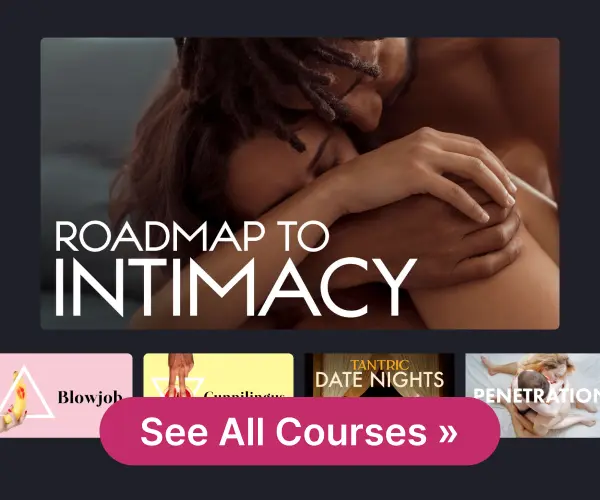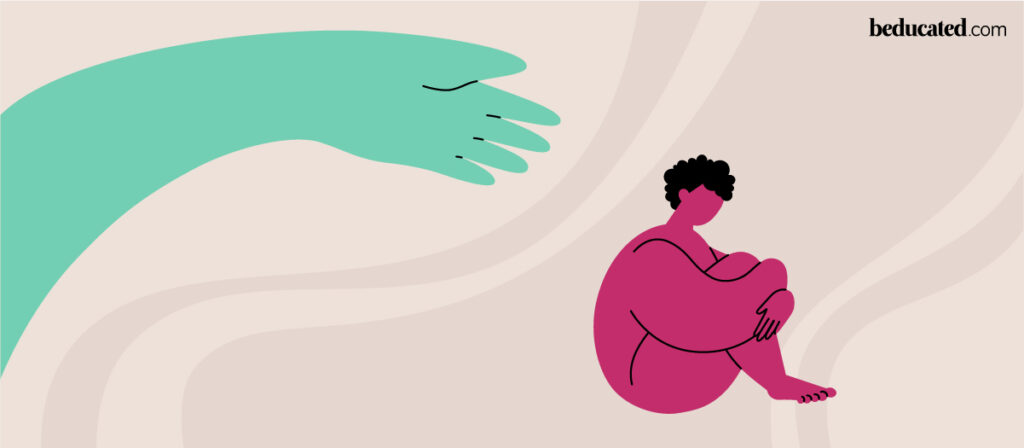How happy are you with the current state of your sex life?
If your answer is “meh,” then you’re in the majority; in January 2024, we asked 1,885 people how they felt about their sex life. To our shock, 60% said they weren’t satisfied.
This bombshell statistic, which resulted from Beducated’s Decoding Desire Survey, got us asking what could be behind such widespread dissatisfaction. To find out, we took a deep dive into the data, combined our findings with everything we know about sex, and created a list of seven “sins” we believe to be killing intimacy.
Make sure to check out Beducated's Online Courses for Couples

1. The Sin of Silence

Not voicing your desires, needs, and boundaries out loud spells doom for intimacy. Your partner(s) can’t read your mind, so it’s up to you to make your voice heard. Lack of communication in the bedroom was the most common issue we identified in the Decoding Desire survey. A whopping 95% of respondents said it was a pain point.
You should communicate clearly when something is wrong. Is the positioning off? Ask your partner to re-adjust. You might think stopping in the middle of the deed might kill the mood, but guess what’s even more unsexy than interrupting sex – one of the parties not enjoying themselves. Is your partner initiating sex when you’re just not feeling it? Take a rain check. Whatever you do, be honest.
2. The Sin of Wanting More

Most people wish they had more sex. Yet data from our survey revealed that more sex doesn’t equal a happy sex life. In fact, one-third of folks saying they wanted a higher frequency of intimacy told us they did it on a weekly or daily basis.
The unsexy truth is that the longer the relationship is, the less often you’ll be intimate. Our data showed that 1 in 5 long-term couples suffered from libido mismatch. We also found that as relationships progressed, women in straight relationships became more and more likely to have a lower libido than their partners.
That doesn’t mean that long relationships are doomed to a life without sex. What it does mean is that people need to be realistic about expectations and, more importantly, focus on quality over quantity. Talk it out with your partner(s), be honest about your wants and needs, and you’ll find a middle ground.
3. The Sin of Routine

Sex that follows the same script repeatedly is a surefire way to make things stale. No matter how long you’ve been in a relationship or how well you think you know what works for you, there is always room for spicing things up. In our survey, 50% of participants said they yearned to try something fresh in the bedroom.
To get creative, you’ll need inspiration. That’s where sexual self-exploration comes in. Take advantage of whatever quiet time you might get and start experimenting. Masturbation can be a tool for exploring your erogenous zones and fantasies. Pleasure-based sex education resources like Beducated can help you discover new techniques to try out with your partner(s) during partnered sex.
Once you know what you like, talk to your partner, listen to what they’d like (or not), and make things interesting.
4. The Sin of Chasing an Orgasm

Great sex doesn’t always end with an orgasm. In an earlier survey by Beducated, we found that 2 out of 3 women admitted to having faked an orgasm. Their most common reason for doing so was to avoid hurting their partner’s ego.
The moral of the story is that we need to stop obsessing over the big O. There are many reasons why a person might not be able to orgasm, ranging from stress to hormonal fluctuations. It doesn’t have to say anything about a person’s performance in bed.
Prolonging sex until one of the parties reaches climax is actually counterproductive and causes harm when there’s no intentional consent involved. Plus, it could make one of the (or all) partners feel inadequate. Maybe because they can’t get their partner to climax, or they’re worried about their own inability to get there. So forget about the orgasm and focus on the pleasure itself, and if it stops feeling good at any point, there’s no shame in stopping. On that note, stopping doesn’t have to mean ending sex altogether – breaks during sex are always an option, too.
5. The Sin of Not Taking Care of Yourself

Neglecting self-care means you’re neglecting your sex life, too. The fact that physical health, mental balance, and stress management are necessary for a happy sex life doesn’t exactly scream groundbreaking science, but there’s a reason they keep coming up. It’s true.
Your mental and physical health plays a vital role in how you feel about yourself. If you’re not confident, that self-consciousness will inevitably creep into the bedroom. Stress is also a huge mood killer — 61% of Decoding Desire participants said stress directly impacted their sex life.
The key to self-care isn’t elusive; just sticking to the basics is more than adequate. According to our survey data, regular physical activity — even as little as once a week — boosts sexual satisfaction, desire, and confidence. Take care of your mental health, too, whether that’s with therapy, journaling, or just a phone call with a friend.
6. The Sin of Inequality

Gender disparities in the bedroom go beyond the orgasm gap. Data from Decoding Desire shows that 1 in 4 women experience low or absent libido — nearly double the rate of men.
We also found that women were disproportionately affected by stress in the bedroom. But what’s really eye-opening is what was stressing them out. Most men said they grappled with work-related stress, which, for the most part, is easier to shake off once you clock out. Women, on the other hand, were more impacted by financial anxiety, compounded by the gender pay gap, a higher incidence of single parenthood, and the tendency to engage in part-time work more often than men. There’s also more family stress, which makes sense since women still shoulder the bulk of caregiving and housework.
Be mindful of how stress may impact your partner(s) differently, and do your part in sharing the burden. Doing your fair share of work could also make your partner feel more positively about you, plus you’ll have (potentially) more time and energy for getting intimate!
As for the orgasm gap, remember that people with vulvas need more than just penetration to orgasm. Take time to explore non-penetrative sex (like oral sex, intimate massages, or fingering) and, as always, communicate.
7. The Sin of Not Educating Yourself

Most of us think of sex education as an awkward high school class focused on pregnancy, STIs, and, if lucky, consent. But your sex life is dynamic; it goes through different stages as your environment, relationships, and health change throughout your life.
Data from Decoding Desire found that Beducated students were 67% more likely to be satisfied with their sex lives than the general average. This goes to show that sex education should be treated as a life-long learning process, not a one-off class we take as teenagers.
Read the full Decoding Desire report here.
Make sure to check out Beducated's Online Courses for Couples






